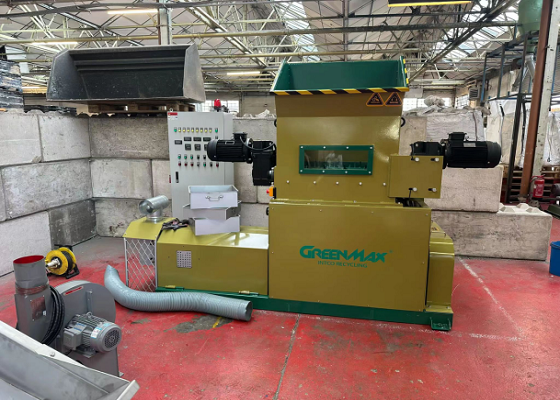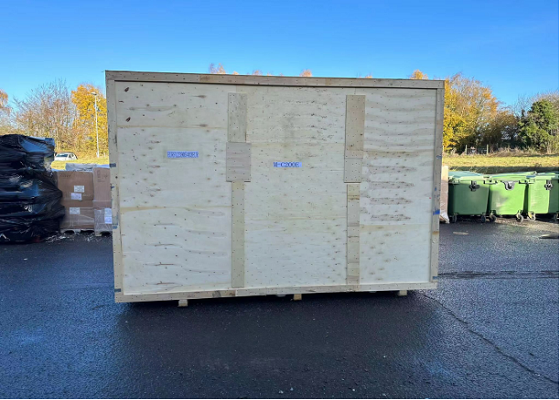Breaking the tradition - using foam densifier to achieve the best efficiency of foam recycling
RGH, a recycling site in Andover, UK, was established in 1999 and has been dedicated to plastic and EPS recycling for 25 years. They are recycling loose, compacted and processed EPS with an annual production capacity of more than 1,000 tons, equivalent to more than 10,000 truckloads of material. RGH has been committed to the pursuit of high efficiency and high quality in the field of EPS recycling. Different from the traditional cold press recycling method used by most companies, RGH is the first company in the UK to use a foam densifier for EPS foam recycling, thus laying its foundation. The basis of high-efficiency output maximizes the value of EPS foam recycling.
RGH installed at least 8 foam recycling machines to recycle EPS waste in the British market 10 years ago. Based on the trust in GREENMAX and the experience and background of GREENMAX’s parent company INTCO Recycling as the world’s largest EPS waste recycler, RGH will launch in 2023 The first GREENMAX foam densifier was purchased for trial in 2023. The machine arrived in November 2023. After 9 months of testing and use, RGH is extremely satisfied with the performance of the foam recycling machine and believes that the GREENMAX regenerative foam densifier is better than his existing one. The machine has better performance and will gradually replace the old one with GREENMAX in the future.

As an EPS recycler that owns both cold presses(foam compactor) and hot melting machines(foam densifier), RGH has a detailed analysis and understanding of the pros and cons of the two machines, and ultimately decided to invest in the foam densifier.
Traditional screw compactor and foam densifier:
The traditional cold pressing recycling method is to use an EPS screw compactor to crush EPS fish boxes, home appliance packaging materials, etc. and then compress them into dense foam blocks t. This method is energy-saving and environmentally friendly, while not destroying the original molecular structure of the material and well retaining the original physical properties of the material. Since the final molding of the material is affected by the material density and compression power, the weight cannot be maintained at a fixed level. The power setting of most existing EPS screw compactors in the British market is far lower than the normal level, resulting in poor compression molding effect of the material and normal screw compression. A truck of processed materials can load 13-15 tons. However, most materials in the UK market can only load 5-6 tons due to performance problems of different compactors. The effect of EPS volume reduction and recycling is greatly reduced.
Different from traditional screw compactor, the foam densifier crushes the material, melts it efficiently, and then cools and solidifies it. This method completely removes the air in the EPS and achieves the best EPS volume reduction effect - a compression ratio of 90:1.
The advantage of foam densifier:1. Simple operation - one-button start and stop
2. Completely controlled by temperature - one-button adjustment
3. Efficient and stable output - to achieve the best material volume reduction effect, one truck can load 20-25 tons of EPS hot-melt material
4. Suitable for multiple material categories-EPS EPE EPP XPS PSP....
More market value - save transportation costs for downstream buyers and improve granulation efficiency
Downstream buyers are generally more inclined to purchase hot-melt materials. On the one hand, hot-melt materials can reduce transportation costs. On the other hand, hot-melt materials can significantly improve the granulation efficiency. The granulation capacity of cold-pressed materials is far lower than the basic granulator. Production capacity, the density of hot-melt material is generally 600-800kg/m3, and the density of compressed material produced by cold pressing technology is 100-300kg/m3 (depending on the performance difference of the screw compactor).

RGH not only processes EPS foam, but also some EPE foam that needs to be processed. Therefore, after the suggestion of GREENMAX engineer, they finally chose a foam densifier model M-C200E. The advantage of this model is that it can take into account both EPS and EPE foam materials, achieving dual uses in one machine. This foam recycling machine has medium power and is a popular model. It is equipped with a commonly used conveyor belt to achieve uniform feeding, which saves labor costs to a certain extent.
We hope that GREENMAX can help more companies in the UK and around the world realize foam recycling and jointly complete the cause of environmental protection.
